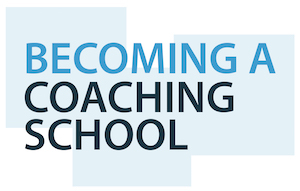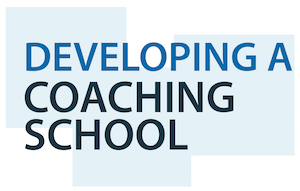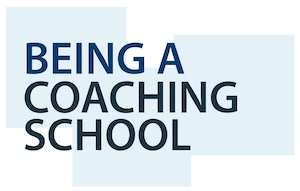Coaching School Quality Awards
A tool for school improvement

Becoming a coaching school - initial training course and follow up
• The school ethos promotes active listening within the management team.
• There is a coaching policy which replace classroom observations, feedback and the associated paperwork.
• The school improvement plan clearly shows coaching as a school improvement tool.
• The budget shows that time and money has been spent on introducing coaching in the school.
• All teaching staff know and understand what coaching is and is not.
• All senior leadership staff trained as coaches.
• All new staff have an induction to what coaching is and are involved in the coaching process.
• Timetable is in place for SLT to coach teaching staff.
• There is improvement in the quality of teaching from baseline measures.
• All SLT’s monitoring through observation is carried out using coaching methodologies.
• Some other monitoring is carried out using a coaching methodology.
• Governors know and understand coaching as a methodology for their school improvement.

Developing a coaching school – ongoing consultancy support
• The school ethos promotes active listening within the teaching and support staff.
• The coaching policy should also include other areas of monitoring and evaluation.
• The school improvement plan clearly shows coaching as a key school improvement tool.
• The budget shows that time and money has been spent on developing coaching in the school.
• All staff including support staff know and understand what coaching is and is not.
• All senior and middle leadership staff trained as coaches.
• All new staff have access to quality training during their first year.
• Timetable of coaching in place which involves all trained staff as coaches and all teaching staff as coachees.
• Coaching opportunities are offered to all classroom based staff termly.
• There is improvement in the quality of teaching for all teachers and support staff from baseline measures.
• SLT, subject and key stage leader’s monitoring of books, planning and observations are carried out using coaching methodologies.
• Governors are beginning to use coaching as a methodology for school improvement and monitoring.

Being a coaching school – reduced consultancy support
• The school ethos promotes active listening at all levels.
• The coaching policy should include all areas of monitoring and evaluation.
• The school improvement plan clearly shows the coaching as the main school improvement tool.
• The budget shows that time and money has been spent on continuing coaching in the school for the long term.
• All teaching, classroom support, administration and premises staff know and understand what coaching is and is not.
• All teaching staff trained as coaches.
• All new staff have access to quality training on arrival.
• Timetable of coaching involves all teaching staff as both coach and coachee more than once a term.
• Learning walks, observations, looking at planning, pupil interviews, helping interviews and looking at outcomes through books and pupil progress meetings are carried out through coaching.
• All support staff have opportunities to coach and be coached by their peers.
• Staff seek opportunities themselves for coaching from colleagues.
• For non-classroom based staff coaching is used for their performance management.
• There is continuous improvement in the quality of teaching for all classroom staff.
• Governor visits are carried out using coaching methodologies,
• Governors meetings reflect the coaching methodology and support the head through coaching.